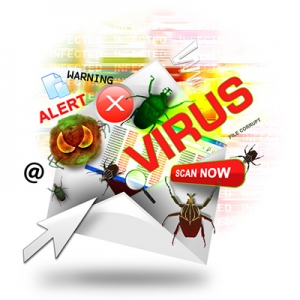If it seems too good to be true then it probably is, goes the old saying. If spam emails were for real you’d be rolling in unclaimed money, pursued by cute singles and some magic bullet or other would be yours to make your life just about perfect. These are all spam offers that really are too good to be true. Sometimes it’s so obvious that you can laugh them off and delete them immediately. Others are cleverer, and therefore much more dangerous. Before you open that unsolicited email, be aware of the threats it might contain.
Some progress has been made in enhanced email security and the fight against spam. Not long ago, 85% of the mail businesses received was spam. Advances in antivirus programs and the takedown of spam generators like Grum Botnet made a difference, and in 2012 that figure had gone down to 67%, according to Kaspersky Lab. The bad news was that though volume had decreased, intensity had escalated, with a 50% increase in malicious files carried by email.
If you don’t open these malware-laden messages, download attachments or click on the links within them you’ll still be okay. You are the last frontier when it comes to protecting yourself against malicious messages, so you need to be smart about email security and recognizing when a message is for real or not. Here are five warning signs to be on the alert for.
Unsolicited mail, Unknown Sender
Whatever they’re selling, you don’t want it if it’s an unsolicited email and you don’t recognize the sender. Of course, it’s hard to tell from the sender’s email address alone. It could be a customer trying to contact you. If you have to open it, just don’t click on any links or download attachments. If you think it might be legitimate and are tempted to open the attachment, contact the sender first to try to verify that it’s genuine. Sometimes you can tell from the way the email is written whether it’s genuine. Generic text and terrible English are often signs of a scam.
Do You Really Know the Sender?
If you recognize a sender’s email address you’re more likely to open it. But there’s a trick called email spoofing, where a genuine email address is pirated and used to suck you in. If you’ve ever received alien mail that claims to be from your own email address, you’ll know all about it. Even worse, if you’re getting spam mail with your name on it, other people are too. Alternatively, conmen can use the names of people or organizations that you are likely to trust so they can reel you in. If you’re a victim of email spoofing, there are solutions. Call Quikteks right away and we can do our best to track down the source, block the IP address and make it stop.
Known Sender Behaving Strangely?
Spoofing involves only your email address being hijacked, but your email account can be hacked into and taken over by the spammers, and used to send spam. If it hasn’t happened to you, you may have received strange emails from your contacts. This can be a sign that their email has been compromised. You may want to let them know that there seems to be a problem with their email security.
Sensitive Data Requests
When you get fake requests for your sensitive or personal data, that’s known as phishing. It can be quite sophisticated, with emails cleverly forged, complete with graphics and logos, to look as if it genuinely does come from your bank, or a government agency, or Paypal, or some other trusted source. The golden rule is to never, ever send sensitive information by email unless you’re absolutely positive it’s safe. Legitimate companies know all about email security and will use their secured, official website or some other safe means, never email.
Sender in Need
Have you ever had an email that tugs at your heart strings, from a person in dire need? The details vary, but they may be stranded somewhere, having a terrible time, or have some other compelling reason to get you to send them a loan, to be paid back with interest. They won’t. Delete the message, and mark it as spam so it gets flagged up by spam filters. This is known as a 419 Advance Fee Fraud, and it also pops up on social media, like Facebook. Once you know about it, it’s an obvious scam, but good people fall for it every day.
We specialize in protecting your network. We can help you with antivirus solutions and offsite quarantining of suspicious mail. If you think your email has been compromised, give Quikteks a call at (973) 882-4644 for help in strengthening your email security.

